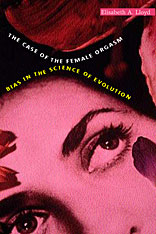
Why women evolved to have orgasms--when most of their primate relatives don't--is a persistent mystery among evolutionary biologists. In pursuing this mystery, Elisabeth Lloyd arrives at another: How could anything as inadequate as the evolutionary explanations of the female orgasm have passed muster as science? A judicious and revealing look at all twenty evolutionary accounts of the trait of human female orgasm, Lloyd's book is at the same time a case study of how certain biases steer science astray.
Over the past fifteen years, the effect of sexist or male-centered approaches to science has been hotly debated. Drawing especially on data from nonhuman primates and human sexology over eighty years, Lloyd shows what damage such bias does in the study of female orgasm. She also exposes a second pernicious form of bias that permeates the literature on female orgasms: a bias toward adaptationism. Here Lloyd's critique comes alive, demonstrating how most of the evolutionary accounts either are in conflict with, or lack, certain types of evidence necessary to make their cases--how they simply assume that female orgasm must exist because it helped females in the past reproduce. As she weighs the evidence, Lloyd takes on nearly everyone who has written on the subject: evolutionists, animal behaviorists, and feminists alike. Her clearly and cogently written book is at once a convincing case study of bias in science and a sweeping summary and analysis of what is known about the evolution of the intriguing trait of female orgasm.

In science, more than elsewhere, a word is expected to mean what it says, nothing more, nothing less. But scientific discourse is neither different nor separable from ordinary language—meanings are multiple, ambiguities ubiquitous. Keywords in Evolutionary Biology grapples with this problem in a field especially prone to the confusion engendered by semantic imprecision.
Written by historians, philosophers, and biologists—including, among others, Stephen Jay Gould, Diane Paul, John Beatty, Robert Richards, Richard Lewontin, David Sloan Wilson, Peter Bowler, and Richard Dawkins—these essays identify and explicate those terms in evolutionary biology which, though commonly used, are plagues by multiple concurrent and historically varying meanings. By clarifying these terms in their many guises, the editors Evelyn Fox Keller and Elisabeth Lloyd hope to focus attention on major scholarly problems in the field—problems sometimes obscured, sometimes reveals, and sometimes even created by the use of such equivocal words. “Competition,” “adaptation,” and “fitness,” for instance, are among the terms whose multiple meaning have led to more than merely semantic debates in evolutionary biology.
Exploring the complexity of keywords and clarifying their role in prominent issues in the field, this book will prove invaluable to scientists and philosophers trying to come to terms with evolutionary theory; it will also serve as a useful guide to future research into the way in which scientific language works.
READERS
Browse our collection.
PUBLISHERS
See BiblioVault's publisher services.
STUDENT SERVICES
Files for college accessibility offices.
UChicago Accessibility Resources
home | accessibility | search | about | contact us
BiblioVault ® 2001 - 2024
The University of Chicago Press









